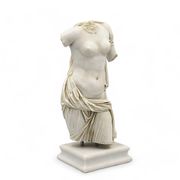Aphrodite: The Goddess of Love, Beauty, and Passion
Aphrodite, one of the most revered deities in Greek mythology, is the embodiment of love, beauty, and passion. Her influence extends far beyond mere romantic love, touching upon the realms of attraction, desire, and the very essence of what it means to be truly beautiful. As with many Greek gods and goddesses, Aphrodite's origins and stories are rich with symbolism and meaning, reflecting the values and beliefs of the ancient Greeks.
Origins and Birth
Aphrodite's birth is one of the most famous and artistic representations in mythology. According to Hesiod's "Theogony," she was born from the sea foam (aphros) when Cronus severed Uranus's genitals and threw them into the ocean. This dramatic and poetic origin story places Aphrodite's birth near the island of Cyprus, leading to one of her epithets, "Cyprian." In another version, she is considered the daughter of Zeus and Dione, adding to her complex and multifaceted nature.
Attributes and Symbols
Aphrodite is often depicted as an incredibly beautiful woman, often accompanied by symbols such as doves, roses, and myrtle. These symbols highlight her association with love and beauty. The myrtle wreath, in particular, was sacred to her, often seen in various works of art and literature.
The sea shell, particularly the scallop shell, is another iconic symbol associated with her birth from the sea. One of the most famous artistic depictions of this is Botticelli's "The Birth of Venus," which, while a Renaissance work, draws heavily on the mythology surrounding Aphrodite.
Love and Relationships
Aphrodite's role as the goddess of love makes her central to numerous myths involving relationships and passion. She is married to Hephaestus, the god of blacksmiths and fire, but her numerous affairs, particularly with Ares, the god of war, are well-documented in mythology. These relationships highlight the complex nature of love and attraction, blending the concepts of beauty, desire, and even conflict.
One of her most famous mortal lovers was Adonis, a story that emphasizes the themes of love and loss. Adonis's tragic death and Aphrodite's mourning are central to his myth, illustrating the deep connection between love and suffering.
Influence and Worship
Aphrodite was widely worshipped across the ancient Greek world, with numerous temples and festivals dedicated to her. The most famous of these was the Aphrodisia festival, celebrated in various cities, particularly in Athens and Corinth. These festivals often included rituals and ceremonies meant to invoke her blessings in matters of love and fertility.
Her influence extended beyond romantic love. Aphrodite was also associated with the power of attraction and beauty, impacting social and political realms. For instance, her support in the myth of the Trojan War, particularly in the judgment of Paris, where he awarded her the golden apple for being the fairest, led to one of the most significant conflicts in Greek mythology.
Modern Interpretations
Aphrodite's legacy continues to influence modern culture, from art and literature to psychology and popular media. Her representation of love and beauty transcends time, reminding us of the enduring power of these concepts. In contemporary psychology, the term "Aphrodite complex" sometimes refers to an individual's overwhelming desire to be admired and loved, highlighting her lasting impact on our understanding of human behavior.
In art, Aphrodite remains a popular subject, inspiring countless works that explore themes of beauty, passion, and desire. Her timeless appeal ensures that she remains a central figure in discussions about love and aesthetics.
Conclusion
Aphrodite, with her profound influence on love, beauty, and passion, continues to captivate our imagination. Her myths and stories offer deep insights into the human condition, reflecting our eternal quest for love and the perfect embodiment of beauty. As we explore her legacy, we find that Aphrodite's essence remains as powerful and relevant today as it was in ancient times.
Whether through the lens of mythology, art, or psychology, Aphrodite's story is a testament to the enduring nature of love and beauty, reminding us of their vital role in our lives and culture.
